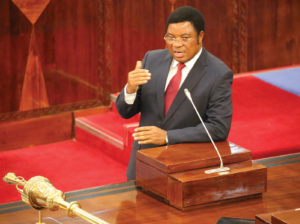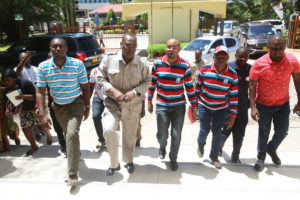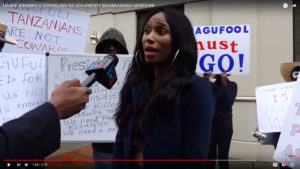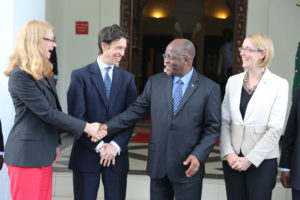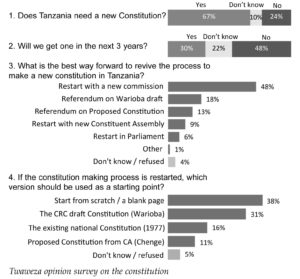by Ben Taylor
President Magufuli has continued to press forward with his agenda of anti-corruption, resource nationalism, industrialisation and infrastructure development. Meanwhile, the chorus of voices who are critical of his presidency continues to grow.
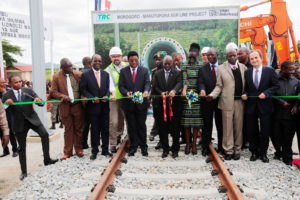
President Magufuli and PM Kassim Majaliwa in Ihumwa to launch the second phase of works to update the rail network
Pressing ahead
In the first four months of 2018, the government of Tanzania has inaugurated a major new power plant on the outskirts of Dar es Salaam [see energy and minerals section]; pressed ahead with extending, electrifying and upgrading the central line railway to standard gauge [see transport]; celebrated the arrival of a new aircraft for Air Tanzania [see transport]; and continues to talk up other “mega projects” including a new port at Bagamoyo, the Stieglers’ Gorge hydroelectric dam [see energy and minerals], and a possible Liquid Natural Gas (LNG) processing plant in Lindi [see energy and minerals in previous issues].
Further, it has completed construction of a 25 km “fort” – a wall – around the Tanzanite mine at Mererani, Arusha, in an effort to prevent the gemstones from being stolen or smuggled out without following proper procedures and paying proper revenues. It has long been stated that more Tanzanite is exported from Kenya and India than from Tanzania, though the gemstone’s only source is in Tanzania. The wall was constructed by the national service arm (JKT) of the Tanzania People’s Defence Force (TPDF), taking less than 4 months, at a cost of TSh 5.65 billion (USD 2.5m). The President promised government employment to all the JKT volunteers – over 2,000 in number – who participated in the work. Further security measures have been put in place including security cameras and ID cards for personnel permitted within the wall.
The government has also reinstated over 7,000 previously fired or suspended employees who did not possess form four (O-level) certificates, and who were employed before May 20, 2004. This followed calls to do so from MPs, and recognises that form four qualifications were not a requirement for government employment before this date. The reinstatement does not include civil servants who had used fake certificates to secure their employment or who were employed after 2004 without proper qualifications. The government announced that the reinstated employees will be given their full accrued salaries since the time of their dismissal, and will be entitled to full retirement benefits.
Some of these developments were among the six issues highlighted by the Prime Minister, Kassim Majaliwa, when he outlined government plans contained in the 2018/19 budget. Specifically, the upgrade and expansion of transport networks – including roads as well as rail – and investment in electricity generation were both mentioned. Beyond this, the Prime Minister also pointed to new spending on water supply services, e-governance for revenue collection, relocation of government business to Dodoma, and maintaining economic growth through implementation of strategic development plans.
Chadema leadership arrested
Shortly before Easter eight senior figures within the largest opposition party, Chadema, were arrested and charged with several counts including sedition and incitement. The charge sheet initially named six individuals, including the national party chairman, Freeman Mbowe, and secretary general, Vincent Mashinji, as well as John Mnyika, Salum Mwalimu, Rev Peter Msigwa, and John Heche. Two further names were later added, including the chair of the party’s women’s wing, Halima Mdee, and Ester Bulaya.
The charges stem from mid-February, during the parliamentary by-election campaign in Kinondoni constituency in Dar es Salaam. The Chadema leaders are accused of staging unlawful demonstrations – the same occasion that tragically resulted in the death of Akwilina Akwilini (see below).
Among the charges are several accusations that Mbowe and others made seditious statements, defined in Tanzanian law as “statements that are likely to raise discontent and promote feelings of ill-will among inhabitants of the United Republic of Tanzania” or “statements made with intent to bring hatred and contempt to the citizens of the United Republic of Tanzania against the lawful authority of the government.”
All eight of the accused deny the charges.
Professor Abdallah Safari, the party’s deputy chairman, spoke on behalf of the party while Mbowe and the others remained in police custody. “This situation is terrifying and it is the right time to seek for international support in advocating for democracy in the country. Our voices alone cannot be heard; this is the time for everyone to join forces in calling for democratic space and the rule of law.”
Administrative delays meant that although bail had been agreed by the court, it proved impossible to release the suspects before the long Easter weekend. They were therefore released on the Tuesday after Easter, having been held for seven days, subject to a condition that they must report weekly to the court in Dar es Salaam.
Meanwhile, another Chadema MP, Joseph Mbilinyi, was sentenced in February to five months imprisonment. The Mbeya Resident Magistrate Court found him guilty of delivering “hate speech” against President Magufuli in December 2017. A party official, Emmanuel Masonga, was also found guilty on the same charge. Both Mr Mbilinyi and Mr Masonga deny the charges.
Policing concerns
Concerns about police strategies and attitudes have grown, after a number of incidents where policing tactics appeared either to be highly politicised or overly aggressive, including three separate incidents in which the actions of the police appeared to cause the death of civilians.
The first such case was Akwilina Akwiline, a 21-year-old student at the National Institute of Transport. She was killed by a stray bullet while passing the site of a confrontation between police and Chadema supporters in Dar es Salaam. Shots were fired by the police in order to break up the march. This took place in February. No arrests have been made.
The second case followed a month later, in Mbeya. Allen Mapunda, a 20-year-old fruit seller at a local market, was arrested while playing pool with friends one evening, as part of “normal patrols” around the city. He was released on police bail the following day to his family, who say he had cuts and bruises on his arms and head and complained of pain in his abdomen. They took him to hospital where he died later that evening, from what doctors described as “internal injuries”. The police denied any responsibility, saying he was fine when released on bail.
Third, at the end of April, Suguta Chacha, the younger brother of Chadema MP for Tarime, John Heche, was arrested along with others at a bar that was open past its permitted hours, close to the Kenya-Tanzania border. He was stabbed while in custody at the police station, and died on the scene. A police officer has been charged in association with the incident.
These incidents followed concerns raised about policing during local government by-election campaigns in late 2017. The Legal and Human Rights Centre (LHRC) reported evidence that police had arrested opposition leaders and agents. LHRC called for the roll of security organs in supervising elections to be reviewed.
Further, the case of Abdul Nondo also attracted wide public attention. Nondo, a student at the University of Dar es Salaam and outspoken chair of the Tanzania Students Networking Programme (TSNP), was reported missing in early March. He re-emerged a day later in Mafinga in Iringa region, where the police arrested him for allegedly faking his own abduction. He was held in police custody for close to three weeks before being charged with any offence. When finally charges were brought, police (unsuccessfully) argued that Nondo should be denied bail for his own safety.
Finally, a journalist with Mwananchi newspaper, Azory Gwanda, has disappeared and the police have reported no progress with investigating his disappearance. Azory had been covering a series of violent incidents against the police, local government and CCM leaders in and around Kibiti, south of Dar es Salaam, and police responses to these attacks.
Growing criticisms
The list of those who have expressed concern at rising political tensions and President Magufuli’s approach to democracy continues to grow.
The US Embassy issued a statement in mid-February that referred to the recent murder – by unknown assailants – of Daniel John and attempted murder of his friend Reginald Mallya, both Chadema members, and called for “a transparent investigation to hold all perpetrators of violence accountable in accordance with Tanzanian law.”
A week later, the European Union delegation in Tanzania issued a more widely ranging statement jointly with the Heads of Mission of the Member States of the European Union in Tanzania and supported by the High Commissioner of Canada and the Ambassadors of Norway and Switzerland:
“We note with concern the recent developments which threaten democratic values and the rights of Tanzanians in a country which is widely respected in the world for its stability, peacefulness and freedoms. We are worried by the rising number of reports of violence in the last months including: the attempt on the life of MP Tundu Lissu; the disappearance of people such as journalist Azory Gwanda; and the lethal assaults upon government representatives, the authorities and citizens which occurred in the Coast Region in the past two years. We join Tanzania’s people in calling upon those responsible, to safeguard the peace and security of democratic process, the country, its citizens and respect for the due process of law without impunity.”
Lent and Easter presented an opportunity for Christian leaders in Tanzania to express their concerns. The Tanzania Episcopal Conference (TEC) of the Roman Catholic church issued a pastoral letter in Dar es Salaam lamenting the deteriorating governance situation in Tanzania, including the restrictions imposed on opposition parties, the repression of mass media and suppression of the freedom of expression. It was signed by all the 36 bishops making up the TEC.
The Evangelical Lutheran Church in Tanzania (ELCT) issued a proclamation, signed by 27 bishops, calling for security organs to ensure that Tanzanians’ lives are properly protected. Leaders of the Anglican and Moravian churches also called for peace, security and justice in their Easter sermons.
In February, more than 100 civil society organisations issued a statement condemning what they called “unprecedented” cases of human rights violations in Tanzania’s history, including “attacks, torture and forced disappearances of rights activists, journalists and even ordinary citizens.”
The government responded to some of these statements, arguing that religion and politics should not be allowed to mix. Further, a statement issued by the Minister for Foreign Affairs, Augustine Mahiga, responded directly to the US and EU. This highlighted “the previous conspicuous silence by the envoys on the unprecedented security threats and challenges which Tanzania has been facing in the Kibiti-Mkuranga-Rufiji triangle,” and “the uncompromising bold actions taken by President Magufuli to stump out (sic) corruption, drug trafficking, tax evasion, poaching and enforce accountability in the public and private sectors”.
“The measures by the 5th phase government have evidently enraged powerful elements from within and outside the country with vested interests in laxity that prevailed before. These forces are resisting and fighting the change through insidious means and malicious intent to discredit the government and tarnish its image by aggravated violent criminal actions in a politically manipulated manner.”
“Our guest partners should make an effort to understand these complex scenarios in the country before issuing unverified sensational and what can be inciting statements to the public.”
Perhaps the most stinging criticism, however, came in mid-March from The Economist newspaper, in a rare leader article on Tanzanian politics. The article, headlined “Tanzania’s sickening lurch”, was accompanied by a longer news article in the same issue headlined “Falling into dictatorship: Tanzania’s rogue President.”
“Until recently Tanzania’s political stability drew investors and donors, spurring one of the fastest sustained streaks of economic growth in Africa,” wrote the paper. But “… progress is imperilled by Mr Magufuli, who is transforming a stable, if flawed, democracy into a brutal dictatorship” it continued. “For Western donors to look away as Tanzania descends into oppression would be to discard much of its progress in recent decades. Most of all, Tanzania’s neighbours need to act.”
Fake news, media and social media restraints
The Economist articles kicked up a minor political storm in Tanzania, with online debate raging particularly fiercely. Within days, a rebuttal appeared on a newly established website from a previously unknown “Belgian doctor,” Dr Herman Louise Verhofstadt. The article, which defended President Magufuli’s record, was widely circulated by supporters of the President, including an approving tweet from the Director of Information Services and chief government spokesman, Dr Hassan Abbas, and extended excerpts were published in the two government-owned newspapers, Daily News and Habari Leo.
The rebuttal was then itself rebutted by someone on social media, also claiming to be Dr Herman Louise Verhofstadt, stating that he had never visited Tanzania and adding that “you need a really poorly performing government to come up with a lie like this.”
Commentators quickly concluded that both the article and the twitter rebuttal were a fabrication – neither were backed up by any other evidence or presence, online or otherwise, to give credence. Instead, they appear to be evidence of the politicised nature of the media, including social media, and indeed a prime example of fake news.
Into this context, the government introduced new regulations under the Electronic and Postal Communications Act, to regulate online activities in Tanzania. Among other things, the Online Content regulations, require bloggers and operators of online forums and online TV and radio to register and pay fees to the Tanzania Communications Regulatory Authority. Anyone writing a blog within Tanzania or any Tanzanian citizens doing so from abroad, for example, will be required to pay an annual fee of TSh 1,000,000 (USD 450) to operate their blog. The regulations also prohibit a long list of different types of online content, including anyone posting “disparaging or abusive words, calculated to offend”, “false content” unless accompanied by a statement that the content is satire and not factual, and “content that causes annoyance”.
Critics have pointed out that although fake news is a genuine problem, these regulations go a lot further. One international newspaper described the regulations as “vaguely worded” and pointed out that “no one imagines that political speech will be spared.”
The regulations come on top of existing laws introduced under Presidents Kikwete and Magufuli that have attracted widespread criticism for undermining freedom of expression, including the Statistics Act, Media Services Act and Cybercrimes Act. All three have been used against critics of the government.
Demonstrations that didn’t happen
A US-based Tanzanian socialite and social media activist, Mange Kimambi, attempted to mobilise nationwide peaceful protests on Union Day, April 26. The protests were to be against what she called “suppression of political freedom and human rights abuses” by the Tanzanian government. Opposition parties denied any connection to Kimambi, while the police and national government leaders restated an existing ban on political rallies of any kind, emphasising instead the need to protect the nation’s peace and security “at any cost”.
President Magufuli warned of a crackdown on any protests. “Let them demonstrate and they will see who I am,” he said. Gilles Muroto, police chief in Dodoma, told journalists the police would make protesters suffer: “they will be beaten like stray dogs.”
In the event, the show of force by police on the streets of major Tanzanian towns and cities was far more visible than any protesters. Police marched and showed off their vehicles and other equipment in highly public displays on April 25 in particular, and maintained a heavy presence on the streets on April 26.
“All we can say is that the California girl managed to bring the toughest of our boys down to the streets, in much ado about nothing,” wrote Jenerali Ulimwengu in the East African.
Small protests took place in Washington DC and Sweden, with a few dozen protesters holding placards outside the respective Tanzanian Embassies. Seven protesters in Dar es Salaam were arrested outside the Central Post Office, and a few other suspected “organisers” were arrested in the days before April 26.

